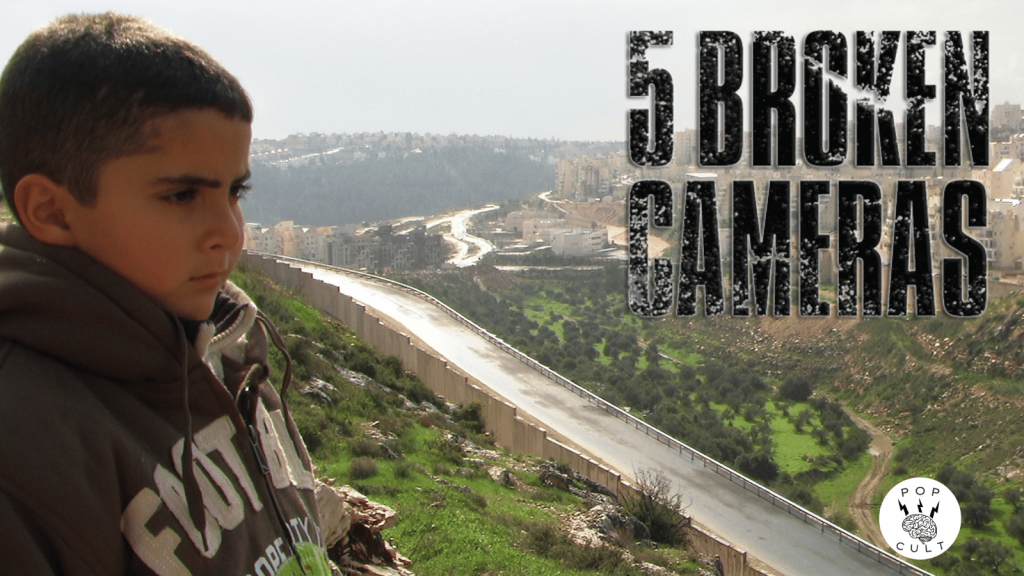5 Broken Cameras (2012)
Written by Guy Davidi
Directed by Emad Burnat and Guy Davidi
Individualism is undoubtedly the mindset in which all Western thought appears to emerge. I’m a big believer that we’re actually a collectivist species forced into these systems, which explains the astronomical rate of people with mental illness worsening. Mental illness occurs regardless of what systems we are under, but it is hugely aggravated under ones that tell sick people they must care for themselves. This way of thinking has led to a common refrain among reactionaries that if individuals simply complied with the demands of hierarchies of power, they would not be harmed. This, of course, ignores that these same hierarchies perpetuate harm as part of their very nature. We are asking people to endure increasing levels of harm so we don’t have to wrestle with our role in these systems, and that will never lead to a solution.
5 Broken Cameras is a documentary following amateur cameraman Emad Burnat as he chronicles the establishment of colonial settlement in his village of Bil’in, where olive orchards are destroyed, and fences are erected to further restrict the movements of the Palestinian people of the West Bank. At the start of this, Emad’s fourth son Gibreel is born, and over the next five years, the child grows as Emad has camera after camera destroyed by the occupation. The filmmaker shows us the people’s efforts to protest the destruction of their land and the removal of their access to it. People are beaten, shot, and even murdered by the soldiers stationed in this area. Each camera Emad uses is either smashed or shot by these same occupiers.
For the voices that keep crying about October 7th, 2023, they are either ill-informed or disingenuous. Things should have never gotten to the point where the events of Oct. 7 happened. But those deaths wouldn’t have occurred without the consistent assaults on Palestinian people for generations by the occupying forces.
In 5 Broken Cameras, we see plainly as Israeli forces throw tear gas grenades at children, shoot unarmed people in the back, drag children out of their homes in the night, pointing an assault rifle at a Palestinian toddler, beating people until they go into a coma, destroyed buildings and olive orchards that took generations to grow, beating an elderly woman for trying to protect her son from their violence, the list goes on and on. And we think people subjected to such Western savagery should just keep their heads down and take it?
Emad was helped by Israeli documentary filmmaker Guy Davidi in editing this footage and building a narrative to give it context. Davidi had already been making films about the Palestinian struggle. Emad garnered attention after it was posted on YouTube and even used as evidence in a case that helped delay the construction of the barriers in the West Bank. It was Davidi who saw that critical figures in Emad’s life served as “characters” to illustrate the different approaches Palestinians had to these assaults. Some were endless fonts of positive rebellion, while others fell into understandable despair.
On working in Israel, Davidi has said: “It was very hard for me to work in Israel. I felt it was a very destructive environment, a very violent environment[…]There is a lot of aggression expressed towards the arts in Israel. I connect it completely with the political situation.” I think this statement points to something very true about all fascistic/reactionary societies, especially the aggression towards the arts.
So many of the loudest mouthpieces in America for regressive thought are failed artists. Ben Shapiro never got his screenwriting career off the ground. Steven Crowder was a child star whose father still manages his life. Michael Knowles is an understandably failed actor. Steve Bannon was a producer who could just never make it. This isn’t to say those who have become successful in Hollywood are bastions of progress. We can tell by the deafening silence of so many in the industry regarding the ongoing genocide that they have clearly chosen their wealth & privilege over their humanity.
Reactionary movements hate art because it is a means to articulate those aspects of being human that are difficult to convey with just words. Through art, a person can use images, sounds, juxtaposition, and, in the case of this film, the raw footage of history to get across the current condition of our species. When you watch people you have gotten to know die by an Israeli bullet in this film, seeing a life that was so vibrant and present fade so quickly is, to put it lightly, a shock to the system.
As someone who grew up relatively protected in the States, I have never seen a person die violently in front of me. Seeing it through the medium of film is still incredibly intense. You are reminded of the fragility of even the toughest, strongest body. It also reminds us of how horribly pointless and destructive all this institutional violence is. It is unnecessary, and thus, it is done out of sheer pathological cruelty by the occupier.
You will be amazed at how close Emad got his camera to the events as they unfolded. You can feel the Israeli soldiers’ rancid breath on your neck as the camera pushes its way into a struggle. The sudden sweat-drenched panic as bullets begin flying will cause your heart rate to jump. There is also tremendous warmth here among the children and the Palestinian community. An image of Gibreel offering an Israel soldier a flower lingers.
For all the promises purported by the “found footage” genre of cinema, nothing can be more potent than documentary filmmaking. The full spectrum of human emotion and experience is captured here: birth & death, the struggle to survive, the love people can have for each other, and the hate that can emerge from the heart as well.


One thought on “Movie Review – 5 Broken Cameras”